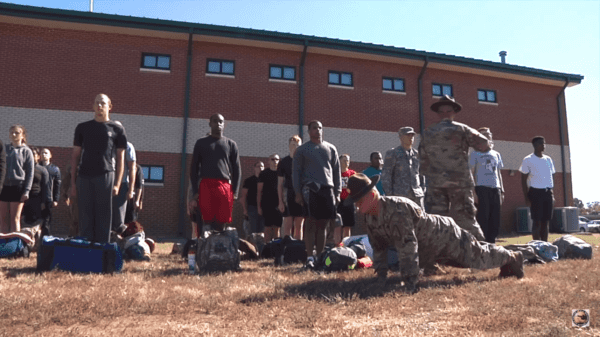One of the most controversial training exercises new recruits experience in U.S. Army Basic Combat Training (BCT) is called the “Shark Attack.” Incoming recruits arrive in fear because of the rumors they’ve heard about the exercise, or because of all of the emotional and physical abuse they have seen in the movies.

Basic training ‘shark attack’ (YouTube)
Of course, there is no hazing or physical abuse in any phase of the US Army BCT, but the myths about it keep recruits nervous. In this video, you will see new US Army National Guard recruits experience the famous “Shark Attack” exercise enforced by Drill Sergeants. The exercise takes place during a drill weekend prior to the recruits shipping off to basic training as a means to prepare them for what’s to come.
These men and women in the video are assigned to the Recruitment Sustainment Program in Smyrna, Tennessee.

Teaching soldiers the front lean rest position (YouTube)
For those who aren’t familiar with what happens in the Army, they might think of a shark attack as something that only happens in the ocean. It might be different, but this shark attack is no less deadly to new recruits.
Here is what happens in a shark attack: Drill Sergeants will single out recruits for a number of reasons and then launch into a verbal assault, ranging from mean to nasty but with one single purpose: to break the recruit down. Things get worse when more than one Drill Sergeant gangs up on the recruit.

New recruits experiencing the ‘shark attack’ (YouTube)
Despite how mean it is, the Army claims that it is needed to prepare the recruits for stressful situations such as fighting ISIS. The shark attack is the most physically and mentally challenging test in boot camp, but it helps to remember that nothing is personal. The “shark attack” is all about making the best recruits and helping them succeed at fighting for the nation.
There are a few tricks in surviving a “shark attack.” Avoiding eye contact with the Drill Sergeants is number one. Invoking a thousand yard stare is an effective way of surviving. No matter what the Drill Sergeant/s says or does, the recruit must always gaze into the distance and never look into the sergeant’s eye. Remaining in control of your emotions, never laughing or smiling or showing any fear are the other ways to keep calm in the face of an attack. The calmer a recruit is, the better they will perform in battle and under pressure. It is a salient life lesson.
Serving in the U.S. Army isn’t easy. Surviving “shark attack” equips recruits with a sense of courage, determination, and unbreakability, both in combat and anywhere else.
Check it out below:



